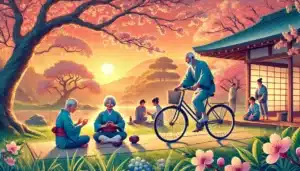Physical Address
304 North Cardinal St.
Dorchester Center, MA 02124

Imagine this: You have studied and studied for a big exam, but then you show up and find that the test is already done. How would you feel? Disgusted, irritated, and remorseful, amiright? Life is much the same — a test we sometimes recognize far too late. If we don’t make the most of the time we have, all of our knowledge, talents, and potential may go wasted.
The Japanese, though, seem to have nailed the secret not just to longer, but to healthier, more purposeful living. Their approach isn’t based on spectacular genetics, but on spectacular lifestyles. Let’s explore the lessons they offer, which we can use to not just live longer but live those extra years full of depth and meaning.
One of Japan’s most popular longevity secrets is “Hara Hachi Bu”, a practice that advises to halt eating when you’re 80% full. This slow-nourishing practice gives your brain and gut time to talk to each other, preventing overeating — and the body’s negative responses, such as obesity and metabolic disorder.
By contrast, some of us eat in the brief time between meetings or with a computer screen between us and the food or when engaged in conversation, failing to register cues from our bodies. Japanese people emphasize on chewing food well, take time to relish every morsel not only to ensure proper digestion but also to give the body the chance to get the maximum “give” from every bite. This fellow is very wise: “Drink your food, eat your water” is a gentle reminder not to forget to chew and to pay attention to hydration — ancient Indian wisdom agrees.
The Joy of Discovering Your Ikigai At the heart of their well-being is ikigai, the Japanese concept for “reason for being.” Having purpose from work, hobbies or relationships helps people lead fuller lives. Purpose fuels passion, reduces stress and enhances resilience.
Mealtimes in Japan are a meditative experience. They’re sitting on the floor, adjusting their posture, which activates the cerebellum — the region of the brain that calms the mind. Food is served in small plates, keeping portions in check.
Contrast that with the contemporary way of eating: food hoovered while scrolling through social media or binge watching shows. By making mealtimes a point of pausing and gratitude, the Japanese show us how to turn eating into a sacred ritual that feeds both body and soul.
At the heart of their well-being is ikigai, the Japanese concept for “reason for being.” Having purpose from work, hobbies or relationships helps people lead fuller lives. Purpose fuels passion, reduces stress and enhances resilience.
Think of historical figures such as Bhagat Singh, who faced execution with steadfastness, or Nikola Tesla, whose love for science made him rise above his physical ailments. When you discover your vocation, life becomes less about mere survival and more about flourishing.
What do I enjoy doing, without being paid for it?
How do I fit into making the world a better place?
These questions reflect important aspects of your Ikigai and can lead to more fulfilling living.
Moving Forward: The Importance of Keeping Active
Movement is life. In Japan, daily life itself provides the high levels of activity the rest of us salt and pepper with visit to the gym. Whether cycling or walking or gardening, they also keep their bodies in mind as well in a constant moving state. This is not about going to the gym for hours — it’s about moving throughout the day.
Science backs this up: moving on the reg promotes the release of endorphins (feel-good chemicals) and increases telomerase, an enzyme that lengthens telomeres, the protective caps on our DNA linked to longevity. Be it a brisk walk, stretching or dancing around your living room, it’s this physical movement that is important in keeping our heart young.
You may Also like : Why Diet and Exercise Don’t Work for 90% of People?
Considered rest homes for the elderly, aged in-place facilities are rare across Japan. Families care for their elders, respect with their wisdom and cultivate inter-communal lineages. This sense of care and connection increases oxytocin, the “love hormone,” which lowers stress, increases happiness and even slows aging.
And with countries that have seen the emergence of old age homes, this indicates a lack of connection. The love of family, friends, community, and all is the emotional fuel that drives us. It’s not only about being loved but loving as well — through kindness, through nurturing relationships, and through keeping in touch with whom you cherish.
Your existence is not yours alone; it’s a gift to the cosmos. By applying these secrets to long life that the Japanese have mastered—chowing down mindfully, seeking a reason to wake up every day, getting off your ass, and sandorini (loving your fellow persons)—you can have a life not just long, but good.
So slow down, breathe, and consider for a minute: What small shifts can you make starting today that echo these timeless life lessons? So maybe it’s chewing your food a little longer, or finding joy in movement, or contacting an old friend, but whatever it is, every step brings you closer to a life of vigor and intention.”
In the words of the ancients, “Abhivadanashilasya Nityam Vriddhopasevinah”—respect for elders leads to longer life, wisdom, fame, and strength. Indeed, let us learn from the wisdom of those who came before us and thrive and not just add years to our age but years to our life.
You may Also like : What is Chakra Healing? How to use the Power of Chakra for Weight Loss?